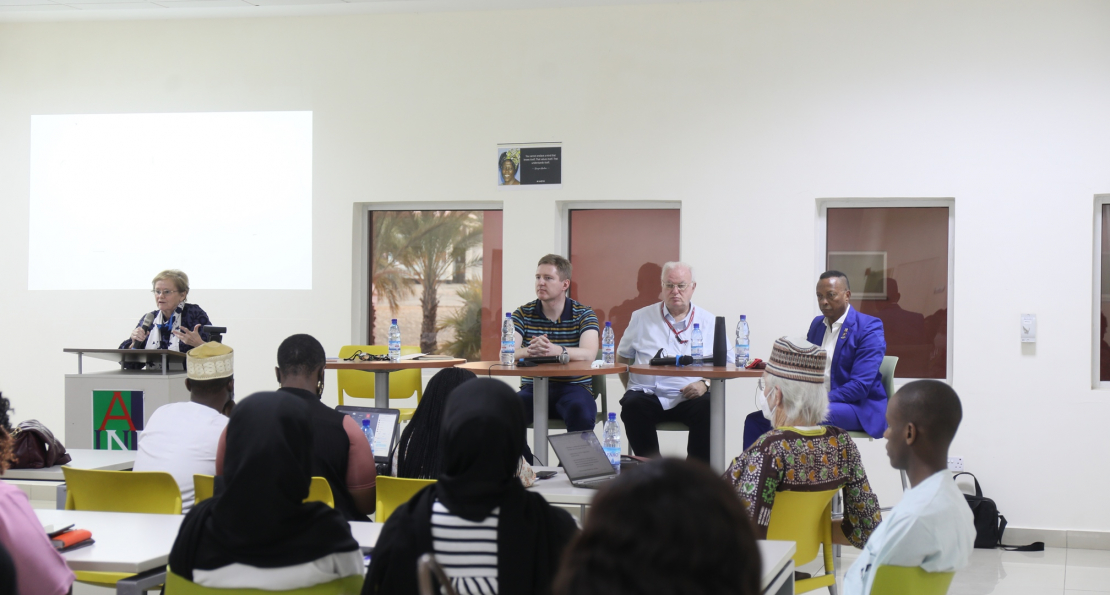Will Russian President Vladimir Putin consider the nuclear option if faced with a humiliating defeat in Ukraine? Will economic sanctions also hurt Western countries even as they devastate Russia's economy? With nine countries having nuclear weapon capability, can talks lead to lasting peace? Why is the United Nations unable to mediate in the Russia-Ukraine conflict and bring lasting peace? These are some of the questions and issues that agitated the minds of many in the audience at the first-panel discussion organized by the AUN Center for Conflict Analysis, Early Warning & Peacebuilding on Tuesday, March 1, 2022.
The Topic: “The Russian Invasion of Ukraine: The Military, Diplomatic, Cultural, and Humanitarian Dimensions” attracted a large turnout of students from different backgrounds and featured four panelists, all experts in their fields. The Dean of the AUN Graduate School and Research, Professor Jacob Udoh-Udoh Jacob, moderated the discussion.
Conflicts are complex, and no part of them has a simplistic approach, the audience heard. Russia's invasion of Ukraine on February 24 has caused deaths and destruction. Ukraine was part of the defunct Union of Soviet Socialist Republics (USSR), which included Russia and Belarus. In the wake of the revolutionary movement that swept through Eastern European countries in the late 1980s and early 1990s, leading to the fall of the Berlin Wall, Ukraine declared national independence on August 24, 1991, and chose to align strategically with Western countries.
The rise to power of Vladimir Putin has witnessed a steady resurgence of Russia's military and diplomatic assertiveness around the defunct Soviet bloc. For Ukraine in particular, Putin has been a source of constant instability. The Russian leader has barely suppressed an imperial urge to restore Soviet-era hegemonic influence and control, even as he aims to carve out and consolidate on a geopolitical ring of fire fencing Russia from Western influences. Significantly, President Putin does not accept Ukraine's proposed membership in the United States-led North Atlantic Treaty Organization(NATO) and has launched this latest aggression against Ukraine to scuttle the move and to punish Ukraine for harboring NATO membership ambitions, among other grievances.
President Margee Ensign, one of the four panelists, reflected deeply on the catastrophic humanitarian fallout of Russia's aggression:
"This is a critical and somber moment in our human history as we see a forty-mile convoy of Russian tanks march towards Kiev, Ukraine's capital, where forty-four million people are attempting to live a free democratic life. It is going to be a humanitarian disaster." The United Nations estimates that already more than a million and a half people have fled Ukraine since the invasion.
On the political dimensions of the conflict, President Ensign noted that, "Until 2001, Ukraine had faced severe economic problems before it went on to become the largest producer and exporter of agricultural goods, and one of the leading economic powers in Europe. Today, Europe's second-largest country is being invaded by Russia. Putin is not only aiming to unilaterally tear apart the rule of the international system that has been in place for eighty years, but is also trying to alter the balance of power that he feels was imposed on Russia after the cold war."
SITC's Professor Alexey Vedishchev framed the crisis in terms of a generational fault line spread across the defunct Soviet Union. Russian-born Vedishchev believes President Putin's generation fundamentally holds on to an old balance of power politics.
"I spent some time in Ukraine while growing up and I have friends and family there. We also have similar languages and cultures. I have been talking with my friends in Russia and nobody wants a war. There are two generations under this conflict - the Putin generation and a younger generation that has a different point of view. My generation thinks Ukraine can join NATO and that should not deter any relationship with Russia."
Dean of the AUN School of Arts and Sciences and former ambassador of the Republic of Ireland to Nigeria Professor Patrick Fay who participated in drafting the famous Good Friday Peace Agreement in North Ireland, explored the economic fallouts of the crisis. He reflected on how the sanctions imposed on Russia by the Western countries might eventually play out.
"When these sanctions hit Russia, it will also inadvertently spill over to the West. This will have a devastating effect on an already existing high cost of living in the world".
Dr. Fay predicted an end to the crisis because nobody wants a war. "The West doesn't want a war and I can imagine that the Russians do not want a war either. In the end I will be optimistic that a diplomatic approach might be the solution. Negotiations have started but that will take a while and a lot will depend on Putin."
The AUN Center for Conflict Analysis, Early Warning & Peacebuilding, is a research-driven body focused on studying, investigating, monitoring, and reporting conflict trends. They organized the intellectually stimulating and participatory session offering
A lively student question and answer session ensued, particularly in regards to the role of the UN. On Wednesday, March 1, 2022, the United Nations General Assembly overwhelmingly adopted a resolution demanding Russia's immediate withdrawal from Ukraine. Nigeria was among the countries that voted in favor of the motion.
Reported by Tina Bitrus


